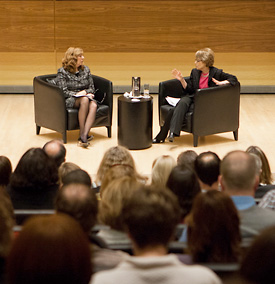Building on the university’s rising global presence was among several initiatives President Mary Sue Coleman discussed in a Q-and-A style program with university communications professionals Jan. 11.
In an interview format led by Lisa Rudgers, vice president for global communications and strategic initiatives, Coleman also talked about subjects ranging from U-M’s growing entrepreneurship and innovation culture to decreased state funding of education and the university’s response.

Lisa Rudgers, vice president for global communications and strategic initiatives, interviews President Mary Sue Coleman at a gathering of university communicators. Photo by Austin Thomason, U-M Photo Services.
The president addressed more than 280 people who are participants in an Office of the Vice President for Communications program called Communicators’ Forum, which provides programming, networking opportunities and resources for campus public relations, marketing and communications leaders.
During the event in Blau Auditorium at the Stephen M. Ross School of Business, Coleman explained the increased emphasis on international connections.
She said the university continues to pursue partnership activities in China, where she has visited on two occasions, and where the university has joint institutes with Shanghai Jiao Tong University and Peking University. She also visited Africa, where a number of U-M faculty, staff and students are working on various programs in health, engineering and other areas.
Next she plans to travel to Brazil in June or July to explore partnership opportunities with the country that has an economy on the rise. She also plans to make one more international trip during her tenure.
U-M needs to promote itself better to international students, Coleman said. “The greatest change is that with rising income the parents now want their college-age international students to attend a U.S. university,” she said.
Coleman noted that 95 U-M academic programs are ranked among the top 10 nationally — more than four times most of the university’s peers — but many outside of the nation do not know about this impressive showing.
“We have a lot of appeal. There’s something different about Michigan. Its breadth, its depth, its ability to help solve problems. We’ve always had a good reputation nationally, but somehow our message has to be sharper internationally,” she said.
Much of that ability to problem solve also has resulted in a culture that successfully has tapped into the entrepreneurial spirit of faculty and students. Initiatives including the TechArb student business incubator supported by the Center for Entrepreneurship, The Samuel Zell & Robert H. Lurie Institute for Entrepreneurial Studies and the Office of the Vice President for Research are just some of the programs that are helping students and faculty develop their big ideas, Coleman said.
“It’s just caught a wave,” she said. “It isn’t just about research. It’s about nonprofits getting started. It’s taking us back to that pioneering spirit.”
Adding that U-M is getting a reputation for its entrepreneurial initiatives and successes, Coleman said the university has an advantage over many U.S. universities in having medical, academic and research campuses in close proximity, which boosts research and innovation activities.
Rudgers remarked to the president, “It was astounding that 5,000 students participated in entrepreneurship activities on campus last year.”
Coleman said she’s noticed that states around the country look to their universities to promote business startup activities to help them out of the economic malaise, and Michigan is no exception.
Addressing the state’s budget problems, Coleman noted that Michigan once was among the top 10 states in funding for higher education and now it is in the bottom 10. She also outlined how far U-M’s appropriation had fallen, now down to the level provided in 1964.
“We’ve been very disciplined at Michigan to cut costs,” Coleman said, “but we haven’t been able to cut our way to sustainability.” To remedy this she suggests a continued dialogue with the state regarding school funding, involving the business community, and to continue cost containment efforts.
“If we don’t have an educated society, we won’t be able to compete globally,” she said.
She also talked about how U-M has had to look to other sources of funding.
“Private support is no longer an option, it is an imperative. We have to have it,” Coleman said of the university’s increasing dependence on philanthropy. Among responses, the president said the university is in the early stages of developing priorities to guide a next major fundraising campaign, one that she expects will focus largely on student, faculty and program support.
The president noted that the meeting’s location, the Ross School, was one of several construction projects provided for in the last fundraising campaign, during which a number of buildings were completed that she said “secured the next century.”
Rudgers said the talk between the president and U-M’s communications professionals — who tell the story of U-M initiatives and the successes of faculty, staff, and students both internally and to the world — was important.
“I think Mary Sue is very committed to the university’s communications activities and understands its importance in a global marketplace,” she said.

